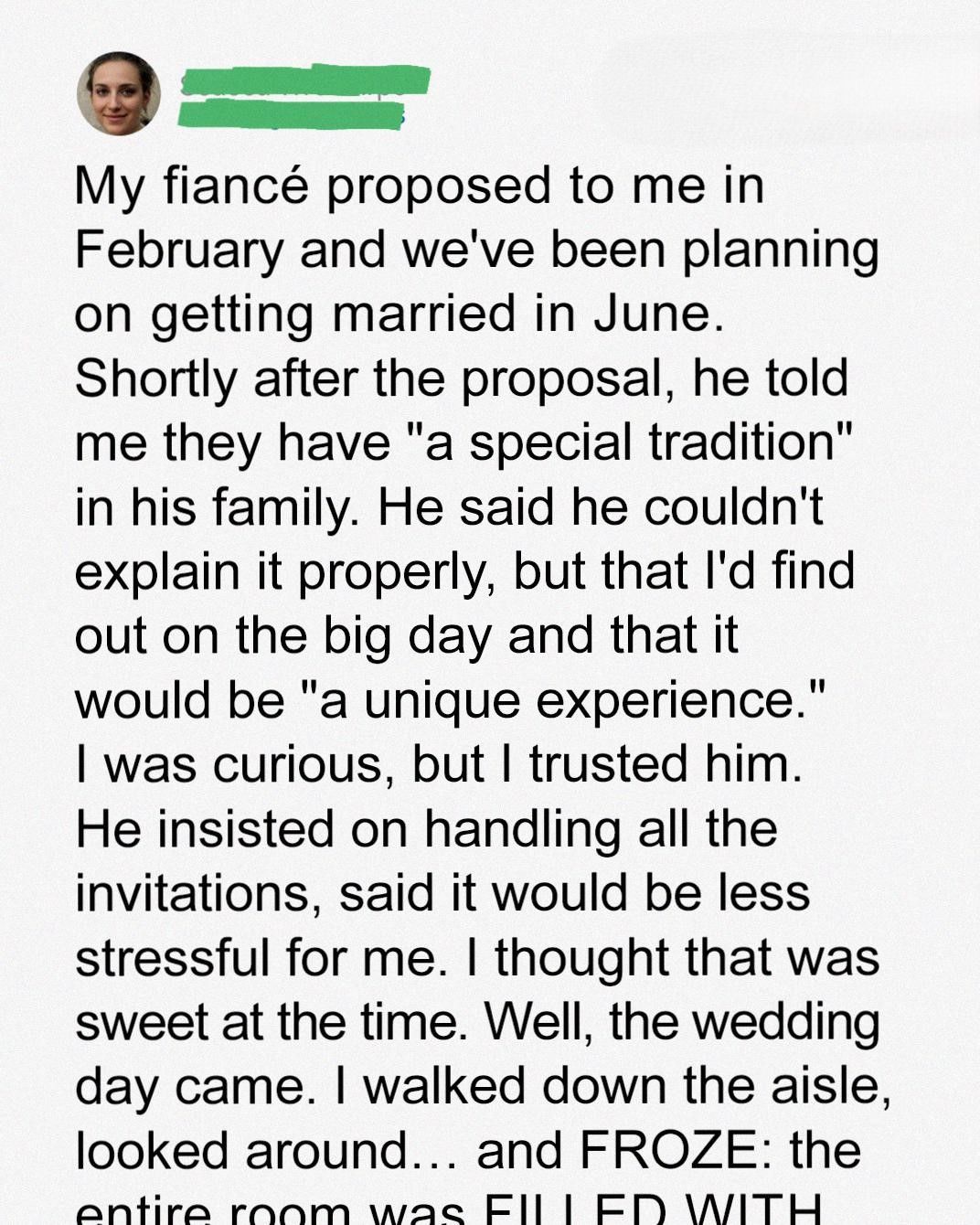Hannah had spent so many evenings imagining her wedding day that the picture in her mind felt more like a memory than a future event. Whenever stress crept in during the planning months, she would close her eyes and revisit that dream. She could almost feel the warm sunlight settling over the old stone church she had loved since childhood. She could hear the first gentle notes played by the quartet warming up in the corner. She could smell the delicate perfume of the roses, freesia, and baby’s breath she had chosen for the ceremony.
She pictured her mother in a soft lavender dress, discreetly dabbing her eyes with a tissue so she wouldn’t smear her makeup. She pictured her older sister taking her hands in one final squeeze before the church doors opened. And she pictured Luke standing at the altar, looking at her with the quiet confidence that had drawn her to him from the very beginning.
For Hannah, this wedding wasn’t merely a celebration — it was the moment where her past, present, and future converged into one meaningful new beginning. It symbolized commitment, partnership, and stepping into a life built together. She never imagined that the day would instead unravel everything she thought she understood about love.
In the months leading up to the wedding, Luke had insisted on taking charge of most of the ceremonial planning. Hannah had been torn between amusement and curiosity when he told her it was part of a long-standing custom in his family. According to him, the groom traditionally planned the ceremony as a gesture of devotion — a cultural symbol honoring the bride and ensuring the day reflected her importance.
At first, Hannah found the idea endearing. She thought it was one of those unusual family traditions that sounded like a blessing more than a burden. When she pushed for details, Luke simply smiled and repeated the same gentle refrain:
“Just trust me. When you see everything, it’ll make sense. My family has always done it this way.”
The words were easy, smooth, reassuring — but something in the back of her mind felt unsettled. Her mother, who noticed every subtle shift in Hannah’s mood, picked up on her hesitation.
“Sweetheart,” she had said one evening, folding linens beside her, “a wedding belongs to both people. Are you sure you’re comfortable not knowing anything? It seems unusual.”
“I think he’s trying to surprise me,” Hannah had replied, although she wasn’t entirely convinced. “He keeps saying it’s special in his family.”
Her mother didn’t push, but the concern lingered in her expression. Even as Hannah tried to shake it off, the uneasiness stayed with her, drifting around the edges of her excitement.
Despite the doubts, Hannah told herself that love required faith. Luke had never given her a reason not to trust him, and she wanted to honor that belief wholeheartedly.
The Morning Everything Was Supposed to Come Together
On the morning of the wedding, the world seemed determined to cooperate. The sky stretched clear and bright, the air felt crisp without being cold, and the gentle sunlight filtering through her bedroom window made everything seem almost enchanted. Her gown — the one she had hesitated over for weeks — fit perfectly, the delicate beading shimmering like tiny stars whenever she moved.
Her mother and sister fussed over her lovingly, touching up stray hairs, smoothing fabric, and offering encouraging smiles. The makeup artist told her she was glowing. Her sister said she looked like herself but elevated. Her mother whispered, “You’re ready.”
Hannah repeated that phrase in her mind like a mantra. I’m ready. I’m ready. She wanted to believe it. She wanted to feel it.
Then the bridal car slowed to a stop in front of the church.
The moment she stepped out and saw the arched stone entrance and heard the faint hum of music drifting through the open doors, a warm feeling washed over her. For a moment, it felt like her vision — the one she’d replayed countless times — had materialized exactly as she’d dreamed.
But when she crossed the threshold, everything shifted.
The Ceremony No One Warned Her About
As soon as Hannah stepped onto the aisle runner, the atmosphere felt off. She couldn’t explain it immediately — the lighting was the same as she remembered, the music played softly, the decor was exactly what she’d pictured.
But something was wrong.
It took a few seconds for her mind to process what her eyes were seeing. Every face turned toward her belonged to a man. Every single one. The rows of pews were filled entirely with men dressed in suits, some smiling politely, some curious, some neutral, but all of them strangers.
Not a single female relative or friend sat among them. Not her mother. Not her sister. Not her bridesmaids. Not Luke’s aunts or cousins she’d gotten to know over the past year.
Just men.
Her chest tightened.
She scanned the faces again, faster now, hoping she had missed someone. Her father stood near the front pew, looking deeply uncomfortable. He gave her a strained smile that didn’t match the moment — a smile she recognized from childhood, the kind he used when he didn’t want her to worry even though something was clearly wrong.
Then she saw Luke.
He stood at the altar with a broad smile, as if everything unfolding before her was exactly what he had promised. As if this room full of strangers and the absence of every woman she loved was perfectly normal.
Hannah’s stomach dropped. Something inside her snapped awake.
The Explanation That Wasn’t Really an Explanation
Before she could even form a question, Luke’s father approached her with an air of calm authority.
“Welcome, Hannah,” he said warmly, as though everything about the situation were ordinary. “We’re honored to witness this moment with you.”
Witness.
The word struck her like cold water.
She tried to respond, but he continued smoothly, as if reading from a script.
“This is how our family observes wedding ceremonies. The men attend the vows. The women hold their own gathering elsewhere to offer blessings.”
Hannah blinked. She opened her mouth, closed it, opened it again.
“My mother isn’t here,” she managed.
He nodded pleasantly, as though the explanation should have been obvious. “Of course she is — in the other venue. All the women were escorted there earlier. It’s a very old tradition.”
Escorted.
Moved without notice.
Separated without consent.
Her pulse hammered in her ears.
“Where are they?” she asked, her voice trembling now.
“In the women’s hall,” he said lightly. “Everything is as it should be.”
But nothing felt right. Nothing felt respectful. Nothing felt loving.
It felt like control disguised as heritage. It felt like secrecy parading as honor. It felt like being silenced — not included.
The music swelled, signaling that she was expected to move forward.
Instead, Hannah stepped back.
Luke raised his eyebrows and gestured for her to walk down the aisle, his smile unwavering. But the more he smiled, the more wrong everything felt.
She turned around.
And she walked straight out.
The Phone Call That Confirmed Her Fears
The moment the church doors closed behind her, she pulled out her phone with shaking hands and called her mother. Her mother answered on the first ring.
“Hannah? Are you okay?” her mother asked, her voice thin with worry. “They brought us to some other building. They kept saying it was part of the customs, but none of us understood what was happening.”
That was all Hannah needed.
Every doubt she’d brushed aside. Every time Luke had told her to “just trust him.” Every moment she had dismissed her own instincts.
Her mother’s voice crystallized everything into clarity.
This wasn’t a misunderstanding.
This wasn’t a cultural quirk.
It was a choice — one made without her.
She lifted the skirt of her gown and began walking toward the building where the women had been taken.
The Gathering That Should Never Have Happened
When she entered the hall, the energy shifted instantly. Dozens of women turned toward her, some confused, some frustrated, some visibly upset. Her mother rushed to her, eyes full of relief.
“What is going on?” her mother demanded. “Why weren’t we allowed in the ceremony? What is this?”
Her sister hovered close, anger flashing across her face.
Hannah swallowed hard and spoke clearly.
“I’m not going through with the wedding,” she said. “Not like this. Not if this is how they think love works.”
Her mother squeezed her hand. Her sister nodded fiercely. A ripple passed through the room — women whispering, then nodding, then clapping softly in support.
Someone handed her a glass of champagne. She lifted it, her hand trembling but her voice steady.
“To a love that includes,” she said. “Not one that divides people or hides them away.”
The women raised their glasses with her.
In that room, Hannah felt more seen than she had all day.
A Night That Became Something Unexpected
Instead of a reception, Hannah ended up in a modest hotel room with her mother and sister, still dressed in her gown. Someone had ordered pizza, and the three of them sat cross-legged on the bed eating slices straight from the box.
They laughed at the absurdity. They cried out of relief and heartbreak. They talked through every odd moment she had overlooked — every time Luke shrugged off her questions, every moment she mistook secrecy for romance.
As the night went on, the weight on her shoulders began to loosen. She realized how much she had been shrinking herself to make Luke comfortable. She realized how many signs she had ignored in the name of being “supportive” and “trusting.”
Leaving the church wasn’t just walking away from a ceremony.
It was walking back to herself.
The Morning After
The next morning, Hannah woke up tired but strangely peaceful. She carefully folded her wedding gown into its garment bag — not with sorrow, but with a sense of closure.
Her phone buzzed repeatedly with missed calls from Luke, messages from his parents, and lengthy voicemails asking for explanations.
She didn’t listen to any of them.
Instead, she opened her social media app. It had once been filled with engagement photos, countdowns, and joyful updates. Now it was a place where she could finally say what she needed to say.
She typed slowly, thoughtfully, and deliberately:
“I didn’t get married yesterday — but I found my voice.”
She hit “post.”
And just like that, the future she thought she wanted dissolved — making room for something far better.
Something she chose for herself.


